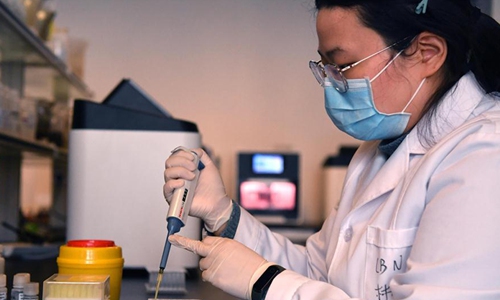HOME >> CHINA
Virus peak in China passes, focuses on imported infections, sporadic community cases: frontline medics
Source:Global Times Published: 2020/3/16 19:28:40

A staff checks the nucleic acid test kit at the plant of Luoyang Ascend Biotechnology Co., Ltd in Luoyang, central China's Henan Province, March 4, 2020. Photo: Xinhua
Chinese doctors who served in the pandemic frontline in Wuhan, Central China's Hubei Province, believed the peak of the COVID-19 outbreak in Wuhan and China has passed and the focus now is on preventing imported cases to China from overseas as well as sporadic cases in the community.
The COVID-19 outbreak in China has almost seen its end, and the second domestic outbreak won't be a great concern. Now the major focus is on imported cases to China from overseas, which are relatively low but will last for a certain time, Cao Wei, deputy director of department of infections disease of Peking Union Medical College Hospital said at a 5G-powered online press conference on Monday.
Sixteen new infections of the novel coronavirus were reported on the Chinese mainland as of Sunday, among which 12 were imported ones reported in Shanghai, Beijing, Guangdong, Yunnan and Gansu, marking the third day in a row when new cases reported in China have exceeded locally transmitted infections.
The peak of the outbreak in Wuhan came to an end; however, we should be observant to sporadic cases in the community, as well as the imported cases from other countries, Du Bin professor and director of Medical ICU at the Peking Union Medical College Hospital said at the same conference.
Diagnosis and isolation of symptomatic cases and close contacts of confirmed patients are the predominant tasks in virus prevention that ultimately helped mitigate the outbreak in Wuhan, according to Du.
"Test, test, test!… Isolate all suspected cases and close contacts if possible. The turning point of the outbreak in Wuhan and Hubei was when all these cases were isolated," Du suggested.
Du and Cao are also among the frontline medical workers who serve in the fight against the virus outbreak in Wuhan.
On Monday, the central government's epidemic control working group urged Hubei Province and its capital city Wuhan to make plans to allow frontline medics supporting the province to withdraw from the country's major battlefield against the COVID-19 in batches.
Reiterating the same, other medics during the conference said they respect the fact that conditions in different countries vary, but urged countries to take serious measures, instead of simply disregarding the damaging capacity of the deadly virus.
As the pandemic continues to worsen globally, countries such as Sweden and the UK seemingly "surrendered" as the former announced to stop testing patients and suspected cases with mild symptoms; and the latter's controversial "herd immunity" approach against the outbreak sparked heated debate and criticism worldwide.
When asked whether the weather getting warmer would reduce the number of infections, Cao said climatic factor in curbing COVID-19 has not been confirmed yet.
Yan Xiaowei, professor and vice chief of the department of Internal Medicine at the Peking Union Medical College Hospital said at the conference, he learned European doctors are now facing the similar difficulties that Chinese doctors experienced in Wuhan at the onset of the outbreak. He advised his European counterparts to take good care of themselves against the infection, which is the prerequisite to take care of patients, their colleagues, and family.
Posted in: SOCIETY